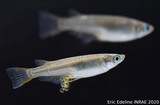EvoSize
 |
Size-dependent anthropogenic perturbations -from genes to ecosystems and back |
|
Research
Context and Issues
Adaptive evolution is driven by both selective forces and trait genetic architectures (evolvability), which deflect the movements of the phenotype on the adaptive landscape. Additionally, selection itself may alter trait evolvability and simultaneously reshape the natural selection that acts back on phenotypes through so-called eco-evolutionary feedback loops. We argue that integrating this whole suite of gene-to-ecosystem processes into a coherent framework would foster significant progress in biology. However, to date, this framework remains largely theoretical.Objectives
EvoSize will provide an experimental framework to explore eco-evolutionary feedback loops in the context of the anthropogenic size truncation that results from harvesting, habitat fragmentation or climate warming.Methodology
We will impose bidirectional size-selection on medaka (Oryzias latipes) populations in the laboratory, thus rapidly generating high growth, low growth, and control (random-selected) lines. In the selected medaka lines, we will measure phenotypic (life history, behaviour) and gene-expression response to selection, and estimate the effects of selection on trait evolvability. In parallel, we will measure the cascading effects of medaka body-size evolution into pond food webs, and examine how these cascading effects alter the natural selective forces that act back on medaka phenotypes.Expected Results
To our knowledge, this will be the first project to fully investigate an eco-evolutionary feedback loop from genes to ecosystem and back. Because body size is so important in ecological processes, results from EvoSize will have a wide scope. Fundamentally, EvoSize will bring a significant breakthrough in our understanding of how evolutionary and ecological dynamics interact. From an applied perspective, EvoSize will provide the necessary knowledge to improve the resilience of human-perturbed ecosystems, and help modellers understand better how anthropogenic impacts (over-fishing) effect natural fish populations.Partners
Beatriz Diaz PauliSylvie Dufour
Charlotte Evangelista
Arnaud Le Rouzic
Leif Asbjørn Vøllestad
Finn-Arne Weltzie
Publications issued from the project
DIAZ PAULI, B. GARRIC, S. EVANGELISTA, C. VOLLESTAD, L.-A. EDELINE, E. (2019) .Selection for small body size favours contrasting sex-specific life histories, boldness and feeding in medaka, Oryzias latipes
People involved
 |
EDELINE Eric, Scientist Phone : +33 2 23 48 55 23 Email : eric.edeline@inrae.fr |
